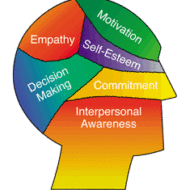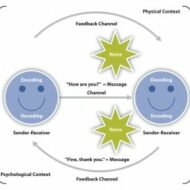Posted by Managementguru in How To, Organisational behaviour
on Mar 30th, 2015 | 0 comments

This discussion is centred around an article from WIKIHOW.COM and an infographic from AMERICAN EXPRESS.COM both talking about “Inter Personal Skill Development at workplace via Clear Communication and Body Language.” Inter personal relationship between personnel in workplace has become a serious issue of debate and most of the organizations spend maximum effort and money to make organizational atmosphere bearable devoid of tension and heat. The wikihow article places four important points before us to be considered: Building strong relationshipsDemonstrating ethical behaviorCommunicating clearly andWorking effectively in teams. As Beatrice Vincent rightly puts it “The people with whom you work reflect your own attitude. If you are suspicious, unfriendly and condescending, you will find these unlovely traits echoed all about you. But if you are on your best behavior, you will bring out the best in the persons with whom you are going to spend most of your working hours.” Conflict is the in-thing to be resolved in a work place which is achieved only through motivating the work-force to accomplish some common objectives, that is, the objectives of the organization. How to Develop Interpersonal Skills This infographic stresses the importance of body language like gestures, eye contact, eye rolling, dressing etc. which openly reveals your inner thinking. Explicitly revealing your frutration or unpleasantness over something or someone is definitely not going to help you in getting along with other employees. If your mannerisms do not reflect your self-control, you are in big trouble. Being open and honest may be contextual but being open and rude becomes subjective. 6 Body Language Mistakes to Avoid The most basic of all human needs is the need to understand and be understood. According to Stephen Covey “The Inside-Out approach to personal and interpersonal effectiveness means to start first with self; even more fundamentally, to start with the most inside part of self — with your paradigms, your character, and your motives. The inside-out approach says that private victories precede public victories, that making and keeping promises to ourselves recedes making and keeping promises to others. It says it is futile to put personality ahead of character, to try to improve relationships with others before improving ourselves. So, first understand where you really stand in terms of your EQ or EI (Emotional Intelligence) the vital quality that decides the kind of inter personal relationship you are going to enjoy with your colleagues. Be emphathetic and open minded and never jump to any...

Posted by Managementguru in Human Resource, Motivation, Organisational behaviour, Principles of Management, Training & Development
on Mar 18th, 2014 | 0 comments

Promoting Effective Communication in the Work Place A purpose or an idea to be conveyed is needed for communication to happen. The question is how well or how successful you are in transmitting the message (mind you! without transforming it) to the receiver in the proposed meaning, whatever the channel might be! Communication must serve the following functions… Effective Control Motivational expression Information Fundamentally communication helps in controlling the behavior of the members of an organization in several ways. Either formal or informal, it controls the activities of the employees by prescribing certain procedures of communication to be followed when there is a grievance or a difficulty regarding his/her job, the work situation etc. Communication provides Vital Information: Communication also motivates people by clarifying what needs to be done, how to be done and how they are performing and what can be done to improve their performance. Most important function is that communication provides vital information that is crucial for members at all spans or levels to make effective decisions. The feelings of members are also articulated as grapevine in an organization, and in a way it serves as an outlet for their emotional expression. Grapevines: Grapevines are always not harmful, they might even give you information about the pulse of people working for you and if you are really sharp, “you can work it out to your advantage. Communication is always referred to as “oxygen”, we can feel only when it breaks down. Communication plays an important role in managerial and organizational effectiveness. Nevertheless, on the other side it can be the root cause of all the problems in your organization. This excellent infographic on Business Etiquette and Body Language Blunders clearly indicates how body language and gestures influence communication to a greater level. Source: www.thewebsitegroup.uk Effective Communication: In general, effective communication is the prerequisite for any healthy organization and the attainment of its standard objectives. Most of us are in fact aware of how our vocabulary has been modified to reflect political correctness. For instance we have replaced certain words like handicapped, blind and elderly by physically challenged, visually impaired and senior. One must be sensitive to others feelings. Words are the primary means by which people communicate; so due importance must be given for politically correct words both in the society at a larger level and in firms at the micro level. Increasingly, I find people like being addressed by their designation capacities. Even people might get offended if you call them by their first names as it is regarded to be disrespectful. But I think it is always better to address a person giving due respect to his position if you are reporting to him. That way there is no scope for conflicts and strained relationships. Western countries are more modern in their outlook and have a broader perspective on human interactions than the east. Gestures: Words mean different things to different people. In organizations, people of different background work together, so they have their own language of expressing their opinions and ideas. So it calls for a uniformity of language that is well understood and appreciated by all. Gestures also play their part in communicating ideas. So self controlled expressions, proper behavior are also necessary that completes a communication process. Ultimately proper communication leads to… Satisfied employees Effective feedback Organisational efficiency Freedom for suggesting ideas Enhanced interpersonal relationships Closely knit organisational network Encouraging trust and openness. Communication is an on-going process and the purpose is “not to dictate but to make the employees understand the big picture” as to how the process imparts success and viability to the...




